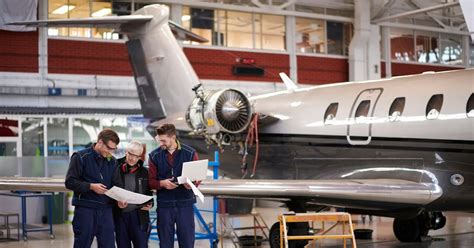Are you considering a career as an aerospace engineer? Are you curious about the earning potential in this field? Aerospace engineering is a challenging and rewarding profession, with the potential for high salaries. In this blog post, we will explore the factors that determine aerospace engineer salaries and how you can maximize your earning potential in this industry.
From the role of education and specialization to the impact of experience and geographic location, we will delve into the various elements that can influence aerospace engineer salaries. Additionally, we will discuss trends in the industry and future prospects for rising salaries. Whether you’re just starting out in the field or looking to negotiate a higher salary, this post will provide valuable insights for aerospace engineers aiming to maximize their earnings. So, if you’re ready to learn more about the earning potential in aerospace engineering, keep reading to discover the opportunities and strategies for boosting your income in this dynamic industry.
Table of Contents
The Importance of Aerospace Engineer Salaries
As an aspiring aerospace engineer, understanding the importance of aerospace engineer salaries is crucial when considering this career path. Aerospace engineer salaries play a vital role in determining the quality of life, job satisfaction, and the ability to meet financial goals. The significance of earning a competitive salary in this field cannot be overstated, as it directly impacts the standard of living and overall well-being of aerospace engineers.
Additionally, aerospace engineer salaries reflect the level of recognition and value placed on the contributions of professionals in this industry. A competitive salary not only acknowledges the skill, expertise, and knowledge required for aerospace engineering but also demonstrates the importance of this field in driving technological advancements and innovation.
Furthermore, the financial compensation received by aerospace engineers has a ripple effect on the industry as a whole. Higher salaries attract and retain top talent, fostering a more vibrant and successful aerospace sector. This leads to greater advancements, efficiencies, and ultimately benefits society by contributing to safer and more advanced aerospace technologies.
Therefore, it is evident that aerospace engineer salaries are not only important for individual professionals in the field but also have broader implications for the industry and the wider community.
Factors that Determine Aerospace Engineer Salaries
Factors that Determine Aerospace Engineer Salaries
There are several key factors that play a significant role in determining the salaries of aerospace engineers. One of the most influential factors is education. Aerospace engineers with higher levels of education, such as a master’s or Ph.D., typically earn higher salaries than those with just a bachelor’s degree. This is because advanced degrees demonstrate a higher level of expertise and knowledge, making these engineers more valuable to employers.
Another important factor is specialization. Aerospace engineers who specialize in high-demand areas such as avionics, propulsion, or spacecraft design often command higher salaries due to their specialized expertise. These engineers bring unique skills and knowledge to their roles, making them more sought after by aerospace companies.
Experience also plays a vital role in determining aerospace engineer salaries. As engineers gain more experience in the field, they develop a deeper understanding of aerospace technologies and processes, which can lead to higher earning potential. Experienced aerospace engineers often take on leadership roles, where their expertise is highly valued and rewarded with higher salaries.
Finally, geographic location can significantly impact aerospace engineer salaries. Engineers working in metropolitan areas or regions with a strong aerospace industry presence generally earn higher salaries than those in rural or less developed areas. The cost of living and demand for aerospace talent in different locations can have a major influence on salary levels for aerospace engineers.
The Role of Education in Earning Potential
Education plays a crucial role in determining the earning potential of aerospace engineers.
Those who hold a degree in aerospace engineering or a related field typically have higher starting salaries compared to those with only a high school diploma or an associate degree.
Furthermore, individuals with advanced degrees such as a master’s or Ph.D. in aerospace engineering often have access to higher-paying jobs and opportunities for career advancement.
Employers in the aerospace industry value the specialized knowledge and skills that come with higher education, and are willing to compensate individuals accordingly.
Specialization: Boosting Aerospace Engineer Earnings
Specialization within the field of aerospace engineering can significantly impact an engineer’s earning potential.
By honing in on a specific area of expertise, such as avionics, astronautical engineering, or propulsion systems, aerospace engineers can position themselves for higher salaries and greater demand in the job market. Employers are willing to pay a premium for individuals with specialized knowledge and skills that can contribute to the development of cutting-edge technology and innovation within the aerospace industry.
Furthermore, specialized aerospace engineers often have the opportunity to work on high-profile projects and collaborations with top industry players, leading to enhanced earning opportunities and career advancement.
Ultimately, specializing in a particular area of aerospace engineering not only allows individuals to deepen their expertise but also serves as a pathway to boosting their overall earning potential within the industry.
Aerospace Engineer Salaries by Industry
When it comes to aerospace engineer salaries, the industry in which they work plays a significant role in determining their earning potential. Aerospace engineers may find employment in a variety of industries, including aerospace product and parts manufacturing, architectural and engineering services, scientific research and development services, and the federal government.
Aerospace engineers working in the aerospace product and parts manufacturing industry tend to have some of the highest salaries in the field. This is due to the specialized nature of the industry and the high level of expertise required. On the other hand, those working in architectural and engineering services may have slightly lower salaries, as their work is often more varied and less focused on a single industry niche.
Another factor that affects aerospace engineer salaries within different industries is the demand for their skills. For example, the federal government, a major employer of aerospace engineers, may offer competitive salaries and benefits to attract top talent. Similarly, aerospace engineers working in scientific research and development services may also command high salaries due to the innovative nature of the work.
In conclusion, the industry in which aerospace engineers choose to work can have a significant impact on their earning potential. Those working in specialized aerospace product and parts manufacturing industries may see higher salaries, while those in more varied fields such as architectural and engineering services may have slightly lower earning potential.
The Impact of Experience on Salaries
Experience plays a crucial role in determining aerospace engineer salaries. As engineers gain more years of experience in the field, their value and expertise also increase, leading to higher earning potential. Employers are often willing to compensate engineers with more experience at a higher rate due to the advanced skills and knowledge they bring to the table.
Additionally, experience allows aerospace engineers to take on more complex and challenging projects, which can contribute to salary increases. With a proven track record of successfully completing sophisticated tasks, experienced engineers can negotiate for higher pay or seek out opportunities with companies that offer greater compensation.
It’s important to note that the impact of experience on salaries may also depend on the type of industry an aerospace engineer works in. Certain industries, such as aviation or defense, may place a higher value on experience and offer better compensation packages to engineers with a substantial amount of time in the field.
In conclusion, gaining experience in the aerospace engineering field can significantly influence an engineer’s earning potential. As engineers continue to grow and develop their expertise, they can expect to see an increase in their salaries and opportunities for career advancement.
Geographic Location and Aerospace Engineer Earnings
When it comes to earning potential, geographic location plays a significant role in determining aerospace engineer salaries. In the United States, for example, aerospace engineers in Washington, D.C., and California tend to earn higher salaries compared to those in other states. This is largely due to the concentration of aerospace companies and defense contractors in these areas, leading to increased demand for skilled engineers and subsequently driving up salaries.
On the other hand, states with a lower concentration of aerospace companies may offer lower salaries to aerospace engineers. This is not only influenced by the demand for engineers, but also the local cost of living. Generally, areas with a higher cost of living tend to offer higher salaries to compensate for the increased expenses, while areas with a lower cost of living may offer lower salaries by comparison. Factors such as housing costs, taxes, and other living expenses all play a role in determining the overall earning potential for aerospace engineers in different geographic locations.
Internationally, the same principles apply. Countries with a strong aerospace industry, such as France, Germany, and the United Kingdom, tend to offer higher salaries to aerospace engineers compared to countries where the industry is less developed. Within these countries, specific cities or regions with a high concentration of aerospace companies may further impact the earning potential for engineers. With this in mind, aerospace engineers looking to maximize their earning potential should consider the geographic location of their job opportunities and take into account the local industry demand, cost of living, and overall economic factors.
Ultimately, while an aerospace engineer may have a certain earning potential based on their experience and education, their geographic location can have a significant impact on their actual salary. Understanding the influence of geographic location can help aerospace engineers make informed decisions about their career paths and job opportunities.
Trends in Aerospace Engineer Salaries
As the aerospace industry continues to evolve and grow, there are several trends that are impacting the salaries of aerospace engineers. One major trend is the increasing demand for aerospace engineers with specialized skills in areas such as composite materials, unmanned aerial vehicles, and spacecraft design. This demand for niche expertise is driving up the salaries for engineers who possess these in-demand skills.
Another trend that is affecting aerospace engineer salaries is the globalization of the industry. As aerospace companies expand their operations internationally, there is a growing need for engineers who have experience working in diverse cultural and geographical settings. This global expansion is leading to higher salaries for aerospace engineers who are willing to travel and work in different parts of the world.
Additionally, the rise of new technologies such as additive manufacturing and electric propulsion systems is also impacting aerospace engineer salaries. Engineers who have the skills and knowledge to work with these cutting-edge technologies are in high demand and can command higher salaries as a result.
Overall, the trends in aerospace engineer salaries point to a positive outlook for the industry, with opportunities for higher earning potential for engineers with specialized skills, international experience, and expertise in emerging technologies.
How to Negotiate a Higher Salary as an Aerospace Engineer
When it comes to negotiating a higher salary as an aerospace engineer, it’s important to do your research. This means knowing what the standard salary range is for your level of experience and education in the aerospace industry. Understanding the market value of your skill set will give you a strong foundation to stand on when entering negotiations with your employer.
Additionally, it’s crucial to showcase your value to the company. Highlight your achievements, successful projects, and any unique skills or certifications that set you apart from other aerospace engineers. By demonstrating your worth, you can make a strong case for why you deserve a higher salary.
Another key strategy in negotiating a higher salary is to be prepared to discuss your long-term potential within the company. This could include your interest in taking on additional responsibilities, pursuing further education or professional development, or contributing to the company’s growth in a meaningful way. By positioning yourself as an asset to the company’s future plans, you can make a compelling argument for an increased salary.
Lastly, don’t be afraid to negotiate. Many employees are hesitant to ask for a higher salary, but research shows that those who negotiate often end up with higher compensation. Remember to approach the conversation with professionalism, confidence, and a clear understanding of your worth. With the right preparation and strategy, you can successfully negotiate a higher salary as an aerospace engineer.
Future Prospects: Rising Salaries in the Aerospace Industry
In the rapidly evolving field of aerospace engineering, the job market is experiencing a surge in demand, leading to rising salaries for professionals in this industry. This change is driven by several factors and is expected to continue in the coming years.
One of the primary reasons for the increasing salaries in the aerospace industry is the rapid advancement in technology. As new innovations and developments in the field continue to emerge, the demand for skilled aerospace engineers is on the rise, leading to higher earning potential for professionals in this sector.
Furthermore, the growing emphasis on sustainability and environmental impact within the aerospace industry has led to an increased focus on research and development of eco-friendly technologies. This has created new opportunities for aerospace engineers, with companies offering competitive salaries to attract top talent in this area.
Additionally, the global expansion of the aerospace industry has opened up new markets and opportunities for professionals, leading to higher salaries and greater earning potential. As the industry continues to thrive and expand, the future prospects for rising salaries in aerospace engineering look promising.





